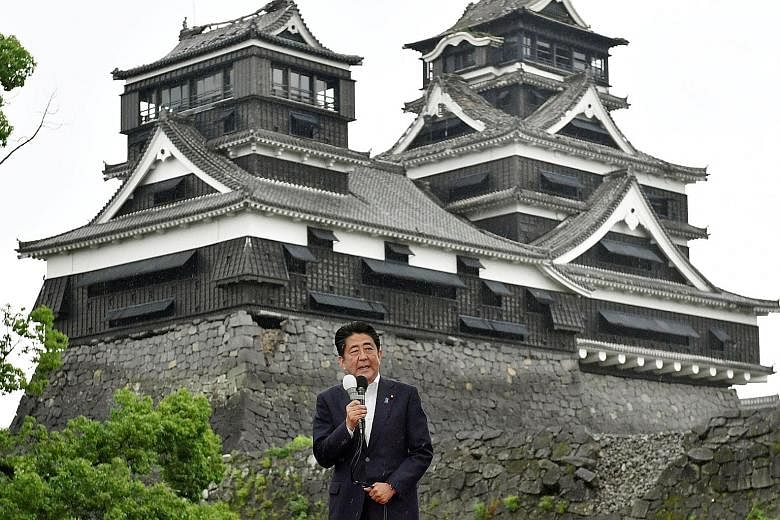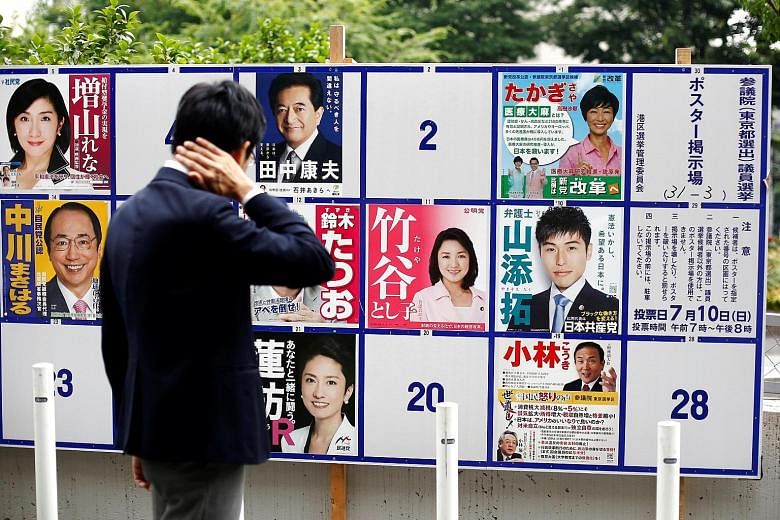Campaigning for Japan's Upper House elections on July 10 started yesterday, with Prime Minister Shinzo Abe going on the defensive over his unpopular economics and defence policies on a visit to a rain- soaked Kumamoto prefecture.
Although the Upper House wields less power in the Diet than the Lower House, all eyes are on the polls which Mr Abe has deemed a referendum on his Abenomics policy.
"The opposition only criticises the Abenomics policy as a failure whenever they open their mouths," he said at the ancient Kumamoto Castle, which was damaged by two earthquakes in April.
"But is it really true?" he asked, rattling off statistics showing how the three-pronged policy of monetary easing, fiscal stimulus and structural reforms has added some 1.1 million jobs since he took office in 2012.
Mr Abe, who heads the Liberal Democratic Party (LDP), also insisted wages are on the up, job supply outstrips demand, and employment rates of fresh graduates are rising.
He acknowledged that Abenomics is "still work in progress" and warned: "If you stop it now, Japan will return to the sluggish dark era of the past."
He was speaking at a rally for party candidate Yoshifumi Matsumura who is standing in Kumamoto prefecture in south-western Kyushu island, where at least 49 people were killed in the quakes in April and another six died this week in mudslides from torrential downpours. He pledged that the government will redouble reconstruction efforts in the prefecture.
Yesterday, Social Democratic Party leader Tadatomo Yoshida criticised Abenomics at crowded Shinjuku in Tokyo, urging more protection for contract and low-wage workers.
"Abenomics protects the wealthy 1 per cent at the expense of 99 per cent of the population," he said, noting that savings from reduced corporate tax rates have not been passed down to ordinary workers.
Economist Yasushi Iguchi of the Kwansei Gakuin University said Mr Abe will face a challenge convincing voters of the viability of Abenomics, since domestic investment and consumption remain low.
"Many Japanese are disillusioned with Abenomics as their lives have not improved much," he told The Straits Times. "Maybe monetary policy has lost its magic."
The Upper House polls are held every three years to elect half of the 242 members in the chamber, who have a six-year term. The LDP and its coalition partner hold 136 seats. Of these, the terms of 60 lawmakers will expire in July and are up for election. The coalition will need 46 seats to keep its majority.
Analysts said voter turnout is likely to be low, given the unpopularity of Abenomics and Mr Abe's desire to revise Article 9 of the post-war pacifist Constitution to allow the Self-Defense Force the right to exercise collective self-defence.
The 2014 Lower House elections, which the ruling bloc won convincingly, had seen a turnout of 52.7 per cent, a post-war record low. And while some 2.4 million Japanese aged 18 and 19 can vote for the first time, surveys suggest the turnout of this group will be low, given a general apathy towards politics. Furthermore, many lack confidence in the opposition, given the botched rule of the Democratic Party of Japan from 2009 and 2012. This year, it merged with two other parties to form the Democratic Party (DP).
Political watcher Jeffrey Kingston from Japan's Temple University told Reuters that while "Abenomics is not working out well and Mr Abe's security policies are not popular", the opposition is weak and discredited. "Although they will be cooperating, I don't think it will make a big difference."
Media surveys this week show that Mr Abe's ruling bloc will likely win the upcoming poll. Mr Abe wants his coalition to win at least 61 of the 121 seats up for grabs. He said on Tuesday at a public debate with other party leaders: "As both Prime Minister and leader of the LDP, I will make an all-out effort towards this goal."


